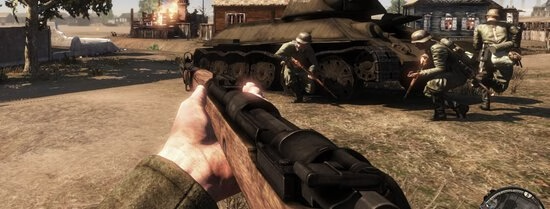Games set in war-devastated European (urban) landscapes’
This PhD-project is part of the REI (Research Excellence Initiative)-programme ‘War! Popular Culture and European Heritage of Major Armed Conflicts’. This programme examines the ways in which the heritage of modern wars is represented and appropriated in contemporary popular culture, and which modifications or additions can be advised to harmonise these appropriations with the requirements and principles of democratic historical and civic education. More information about this research programme can be found here.
The project about games focuses on how World War II and recent armed conflicts, such as the civil war in former Yugoslavia, are expressed and appropriated through commercial digital games. How are these wars represented and simulated through gaming? Why do gamers play these games and how do they think about war?
In recent years, historians and memory scholars have devoted a lot of attention to the legacy of modern wars, and World War II in particular, in our contemporary culture (Lorenz, 2010). In the Netherlands, this has resulted in studies on how the public thinks about the importance of World War II, and how the war is rendered through monuments and museums, documentaries on television, and education (e.g. TNS Nipo, 2015; Van Vree, 2004; Vos, 1995; Hondius, 2010; Grever & van Boxtel, 2014).
However, historians have only selectively paid attention to the expressions of World War II and more recent armed conflicts, such as the civil war in former Yugoslavia in popular culture. In particular, they have overlooked the ways in which these expressions are appropriated by consumers, who should be regarded as active participants in the historical signification process (de Groot, 2008; Ribbens, 2014). It particularly holds true for historical games, which have received some attention in recent years, but only in a very selective way. Therefore, this project focuses on (commercial) games about World War II and recent armed conflicts, and how these games are appropriated by the respective game communities. How are modern wars, and World War II in particular, presented in digital games, and why do people play them? What do players appreciate the most about these games? And how do players engage with the content of these war-games, both during and outside of the actual gameplay activities?
In addition, several researchers stress that renditions of war history through popular culture transgress national boundaries. Popular films like Schindler’s List, Inglorious Basterds and Saving Private Ryan are being watched all over the world, and the same holds true for digital games; developers create them for an international audience, and gamers in different countries connect with each other online. It brings up the question how this phenomenon influences the cultural remembrance of armed conflicts. As has been described by Levy and Sznaider (2002), media representations, of the Holocaust in particular, have increasingly become part of local remembrances in a globalised world, thus resulting in the emergence of a trans-national or even cosmopolitan memory. Therefore, this research project focuses on whether or not playing games about modern wars contributes to the emergence of these trans-national memories. How do players think about World War II and other, more recent armed conflicts? Do they talk about specific themes, and do they refer to the moral engagements as described by Levy and Sznaider? Or do players emphasize local, national or other historical narratives and memories?
The project consists of two major parts. First off all, a study will be made of the ways in which World War II and recent armed conflicts are represented and simulated in popular commercial digital games. Second, the motivations, engagements and opinions of a group of Western European gamers will be analysed, also by looking at how playing games influences the ways in which these wars are being remembered. The project relies on research methods developed in the fields of game studies and uses & gratifications research, and is therefore fundamentally interdisciplinary in its approach.
Research Team
PhD Candidate
Promotors
Research Excellence Initiative
This project is part of the REI project 'War! Popular Culture and European Heritage of Major Armed Conflicts'. For more information, please see the REI project website.
Publications
Van den Heede, P. Historisch geweld in real-time. De voorstelling van de Tweede Wereldoorlog in first person shooter-games. Tijdschrift voor geschiedenis, Vol. 128 (1), 93-108. Read here.




